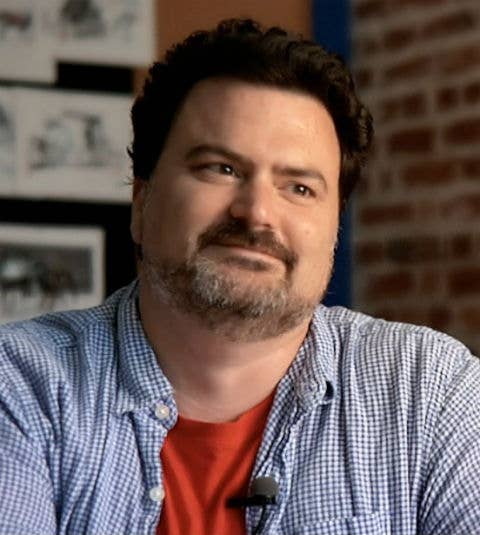Equity crowdfunding's early success asks tough questions of Kickstarter
Kingdoms and Castles' success proves the model, Tim Schafer says, and Fig's Justin Bailey sees a niche future for donation-based crowdfunding
With the success of Lion Shield's Kingdoms and Castles, equity crowdfunding finally has the evidence to silence its dissenting voices. According to Double Fine CEO Tim Schafer, who sits on the crowdfunding platform's advisory board, "until we actually paid people money, nobody was going to really take it seriously."
Speaking to GamesIndustry.biz before his keynote interview at Milan Games Week, Schafer enthused about the impact Kingdoms and Castles' could have on the status of equity crowdfunding as a concept, and the Fig platform in particular.
"I was waiting for that moment since we founded it," he said. "To be able to show people, because when it first started there were a lot of questions. It's really new, and especially with crowdfunding people are skeptical; they want to know, 'where does this money come from?'"
"Until you actually pay people money nobody was going to really take it seriously. Fig was able to write cheques"
Tim Schafer
Indeed, we were among those asking pointed questions back in 2015, shortly after Fig officially launched, prompting a response from Gambitious co-founder Mike Wilson, another of the pioneering figures in equity crowdfunding. In Schafer's view, that kind of debate was inevitable, but far easier to justify in the absence of solid proof that the concept really works.
"By having a game that's actually returned two times on the investment? I mean, you can talk and talk and talk and talk about this stuff as much as you want, but until you actually pay people money nobody was going to really take it seriously. Fig was able to write cheques.
"There'll probably always be someone who's making crazy Youtube videos [criticising equity crowdfunding], but I think that this, at least, is the first time we've been able to prove it to the public. We always knew it was a very sound and interesting platform."

The people who bought shares in Kingdoms and Castles saw a 100% return on their investment in two weeks. Lion Shield made its development costs back in just 48 hours, and earned more than $1 million in revenue across the fortnight; impressive figures for any independent developer, let alone the first to release a game funded through Fig. In fact, Schafer is engaged with the notion that Fig itself played a part in helping the game - already a high quality product, he stressed - to achieve that level of success.
"Whenever you do a crowdfunding campaign you get a community of advocates," he said, making sure to include donation-based platforms like Kickstarter in that assessment. "If people believe in you enough to invest money, then they believe in you enough to talk about you. It's one of the great things about crowdfunding, and maybe with Fig they feel that even stronger."
Schafer will find that out for sure next year. Having raised millions of dollars for projects through Kickstarter, Double Fine switched to Fig for its biggest game in years: Psychonauts 2, which raised almost $4 million in equity crowdfunding from unaccredited investors. Certainly, when we spoke to Fig CEO Justin Bailey at Digital Dragons earlier this year, he mentioned a more constructive and positive attitude as a key difference between "donation and charity" crowdfunding (Kickstarter, IndieGogo, etc.) and equity-based platforms.
Put simply, people who back projects on Kickstarter or IndieGogo often feel like they're buying a product, though in a strictly legal sense that isn't the case. This misconception is understandably commonplace among people donating money, especially when those donations are often incentivised with the promise of a free copy of the finished game. This somewhat misplaced sense of ownership is at the root of a great deal of anger around crowdfunded projects that either fail or underwhelm.

"One of the first things that people say is, 'Do you see how mad people get when it's $20 [donation]? How made are they gonna get when it's $2000?'," Bailey said. "But the thing is that they're not giving it [on Fig]; they're investing it, and because of that they actually act a lot more responsibly."
Bailey is hardly an impartial figure when it comes to Fig, but at Digital Dragons he made a convincing case for the ubiquity of the donation-for-reward model contributing to a sense of fatigue around crowdfunding in general. When Sony gave time and space on its E3 stage to Shenmue 3, Bailey saw it as "the peak of reward-based crowdfunding" - and potentially the start of its decline.
"The whole narrative of a major publisher - specifically Sony - using crowdfunding to fund a campaign, and them being the ones to profit from it, didn't go over too well," he said. This was one factor among several in "the narrative changing a little bit" around that time, along with crowdfunded projects with notable figures attached hitting the rocks, and the release of disappointing products after backers' waiting for years. All told, the dynamic had started to seem heavily weighted towards the creators, without enough protections for those donating.
"There's a risk of the charitable donations side of it going away, and I think for the most part it should go away"
Justin Bailey
In fact, the success of Kickstarter games has also contributed towards that fatigue. In his talk, Bailey pointed out that the top 50 crowdfunded games raised almost $50 million from backers, and they went on to bring in an order of magnitude more than that in revenue - based on his "extrapolations" from available data.
"The whole idea with Kickstarter is that the name really fits very well," he said. "It's this one-time tapping into your community, into their goodwill. Once you get that and you're successful, the thought is that you use those proceeds to fund future projects - not go back and continue to get free money."
Bailey openly admitted his own lack of objectivity, but Fig was established to provide a more sustainable alternative to the ubiquitous but deeply flawed version of crowdfunding offered by IndieGogo or Kickstarter. If that model is to remain, he said, it is better suited to games that represent an "expression of the art, that people want to support just so it exists," rather than games created with a purely commercial agenda,.
"I do think there's a risk of the charitable donations side of it going away, and I think for the most part it should go away," he said, save for the "expression of the art" exception mentioned above. "We're going to attempt to get our share prices down to $50, and make that so it's workable.
"And you still get a free copy of the game."
GamesIndustry.biz was a guest of the Italian trade body AESVI at Milan Games Week.








